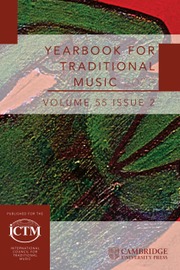Article contents
Zoltán Kodály and the International Folk Music Council
Published online by Cambridge University Press: 07 March 2019
Extract
Like all exceptionally creative people, Zoltán Kodály was an untiring and strongly focused worker. Music education, folk music research and composition are considered his most important fields. Regardless of certain preferences at one time or another, he always understood his work in these diverse areas as mutually supporting an integral whole.
- Type
- Articles
- Information
- Copyright
- Copyright © 1985 by the International Council for Traditional Music
References
Notes
1. On the history of the ICTM, cf. Maud Karpeles, “The International Folk Music Council—Twenty-One Years,” Yearbook of the IFMC. 1, 1969: 14-32.CrossRefGoogle Scholar
2. Letter dated 10 December 1961 in the ICTM Archives. The date must be erroneous. Jaap Kunst died on 7 December 1960. Kodály's appointment as president was announced in the Bulletin of the IFMC XIX, 19 April 1961, p. 3. I wish to thank Nerthus Christensen for her search of the ICTM archive.Google Scholar
3. In the ICTM archive.Google Scholar
4. Cf. Erich Stockmann, “The Study Group on Folk Musical Instruments: Its Achievements in Fifteen Years of Activity,” Yearbook of the IFMC. 8, 1976: 13-20. Reports on meetings appeared in the publication series of the Study Group, Studia instrumentorum musicae popularis, Vol. I-VIII, ed. by Erich Stockmann, Stockholm 1969ff.CrossRefGoogle Scholar
5. Handbuch der europäischen Volksmusikinstrumente, ed. by Ernst Emsheimer and Erich Stockmann, Leipzig 1967 ff. Cf. also Erich Stockmann, “Die europäischen Volksmusikinstrumente. Möglichkeiten und Probleme ihrer Darstellung in einem Handbuch,” Deutsches Jahrbuch für Volkskunde 10, 1964: 238-253.Google Scholar
6. Leipzig 1967.Google Scholar
7. Cf. “Foundations for the Analysis of the Structure and Form of Folk Dance: A Syllabus,” Yearbook of the IFMC 6, 1974: 115-135. German version: Grundlagen der Struktur- und Formanalyse des Volkstanzes, ed. by Rosemarie Ehm-Schulz and Kurt Petermann, s.l. [Leipzig, Neustrelitz], 1976.CrossRefGoogle Scholar
8. “Zoltán Kodály, ein Erzieher zum historischen Bewusstsein,” Deutsches Jahrbuch der Musikwissenschaft für 1962, Leipzig 1963, pp. 60–62.Google Scholar
9. Cf. also Kodály, Zoltán, “Eine Vorbedingung der vergleichenden Liedforschung,” in: Studia Memoriae Belae Bartok Sacra, Budapest 1956, pp. 7–8.Google Scholar
10. “Opening address by the President,” Journal of the IFMC 17, 1965: 5.Google Scholar
11. On the goals of the Study Group, see Oskár Elschek, “Zum gegenwärtigen Stand der Volksliedanalyse und Volksliedklassifikation: Ein Forschungsbericht der Study Group for Analysis and Systematization of Folk Music des IFMC,” Yearbook of the IFMC 8, 1976: 21-34, and “Ziele, Forschungsstand und Aufgaben der Volksliedanalyse und Volksliedklassifikation in bezug auf die Studiengruppenarbeit,” Studia Musicologica 20, Budapest 1978: 217-226; Doris Stockmann, “Zur Arbeit der Study Group of Folk Music Systematization des IFMC,” in: Analyse und Klassifikation von Volksmelodien, Krakòw 1973, pp. 9–30. The following reports of meetings were published: Methoden der Klassifikation von Volksliedweisen, ed. by Oskár Elschek in cooperation with Doris Stockmann, Bratislava 1969; Analyse und Klassifikation von Volksmelodien, ed. by Doris Stockmann and Jan Steszewski, Kraków 1973; Bericht über die 5. Sitzung der Studiengruppe für die Systematisierung von Volksliedweisen, ed. by Walter Deutsch, Wien 1973; Methoden der ethnomusikologischen Analyse (Vorbericht), ed. by Oskár Elschek, Bratislava 1975; “Bericht über die 7. Tagung 1978 in Debrecen (Ungarn)”, in: Studia Musicologica 20, Budapest 1978; Bericht über die 8. Tagung 1981 in Weimar (DDR), in preparation.Google Scholar
12. The following conference reports were published: “2. Tagung 1970 in Bruno (ĈSSR)”, in: Studia Musicologica 13, Budapest 1971; “3. Tagung 1972 in Sárospatak (Ungarn)”, in: Studia Musicologica 15, Budapest 1973; 4. Tagung 1975 in Kazimierz Dolny (Polen): Historische Volksmusikforschung, ed. by Ludwik Bielawski, Alois Mauerhofer and Wolfgang Suppan, Kraków 1979; 5. Tagung 1977 in Seggau (Österreich): Historische Volksmusikforschung, ed. by Alois Mauerhofer and Wolfgang Suppan, Graz 1978; 6. Tagung 1979 in Medulin (Jugoslawien): Historische Volksmusikforschung, ed. by Alois Mauerhofer in cooperation with Jerko Bezić, Graz 1981; 7. Tagung 1982 in Limassol (Zypern): Historische Volksmusikforschung, in preparation.Google Scholar
- 1
- Cited by


